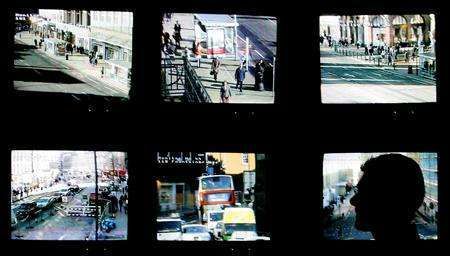The Loss of Privacy in America
There are 4.2 million closed-circuit TV cameras spying on people as they go about their lives in Great Britain. Cities around America are following Great Britain's lead in watching people's every move. At what cost?
In
The Washington Times,
former Republican member of the U.S. House of Representatives from Georgia Bob Barr writes:
Though the lion's share of publicity surrounding Tony Blair's recent departure as Britain's prime minister focused on his legacy as George W. Bush's top foreign cheerleader, a more lasting legacy for Mr. Blair's lengthy tenure as Britain's chief "decider" will be that he greatly accelerated Great Britain's ascendancy to the position of the "most surveilled" society in the world. Still, Michael Bloomberg, the Democrat-turned-Republican-turned-independent mayor of New York is giving Mr. Blair a run for the money as the most surveillance-hungry public official in the world.
Even though officials in other cities are embracing and installing surveillance cameras in huge numbers — Chicago, Detroit and Washington, D.C., to name a few — the latest plan unveiled by Mr. Bloomberg and his equally surveillance-enamored police commissioner, Raymond Kelly, leaves these other American cities in the surveillance dust. Truly what we are witnessing being created here is a 21st-century Panopticon.
The Panopticon, as envisaged by British philosopher Jeremy Bentham (1748-1832), was a society (initially proposed as a prison) in which surreptitious surveillance of the citizenry was always possible and ever-known. Control was exercised not by being surveilled continuously but by each person knowing they might be under surveillance at any time, or all the time.
Bentham was a man ahead of his time. His pet project was never fully carried out because the technology available at the time, relying as it did on direct, physical surveillance (electricity as a harnessable force, with which Benjamin Franklin was just then beginning to experiment, was still more than a century away) made creation of a workable Panopticon infeasible. Were Bentham alive today, he probably would be the most sought-after consultant on the planet.
The key to the surveillance society foreseen by Bentham more than two centuries ago was control. Crime was rampant in late 18th-century and early 19th-century London. Controlling the populace by modifying behavior became the central problem for Bentham and other social scientists of the day.
Of course, the notion that surveillance is key to control was not new with Bentham; centuries before, the Greek philosopher Plato had mused about the power of the government to control through surveillance, when he raised the still-relevant question, "Who watches the watchers?"
More recently, of course, George Orwell gave voice to the innate fear that resides deep in many of our psyches against government surveillance, in his nightmare, "Big Brother is Watching You" world of the novel "1984."
Whether in Bentham's world, or Plato's or Orwell's, the central task is to modify behavior by convincing people that the government — that entity with power over their lives — may be watching them all the time or at any particular time. As 20th-century American philosopher and advocate of personal freedom Ayn Rand noted, taking away a person's privacy renders to the government the ability to control absolutely that person.
In fact, studies by Bentham and others have established that individuals do in fact modify their behavior if they believe they are being watched by authorities.
Whether learned of these philosophical treatises or not, Mayor Bloomberg and former Prime Minister Blair epitomize the almost mindless, unquestioning embrace of surveillance as the solution to problems — real, manufactured or exaggerated — that pervades government post-September 11, 2001. Fear of terrorism as much as fear of crime is the currency by which government at all levels convinces a fearful populace that a surveilled society is a safe society.
Of course, Messrs. Bloomberg and Blair have one benefit available to them that was largely denied Bentham — money. Lots of money. "Homeland security" money taken from the wallets of taxpayers, but treated by government appropriators as theirs by right, is eagerly ladled out for cameras to surveill all. Add the magic words "for fighting terrorism" to your request for federal money and the chances of securing those dollars are made many times greater.
Not only is money readily available for government agencies to install, monitor and expand surveillance systems, but the cameras themselves are magnificent generators of money. Already in London, vehicle owners are billed for using their cars and trucks in certain areas and at certain times, through use of surveillance cameras that photograph, record and track vehicle license plates. The multimillion-dollar system being set up by Mayor Bloomberg and Commissioner Kelly will almost certainly be similarly employed down the road.
With more than 4.2 million closed-circuit television surveillance cameras now operating in Great Britain (the vast majority in and around London), Mr. Bloomberg has a long way to catch up to his British counterparts. Yet the eagerness with which he is approaching this challenge, coupled with the easy money available to him and a largely ignorant and compliant citizenry willing to surrender their privacy in the vain hope that thousands of surveillance cameras will guarantee their safety, bodes well for the Gotham City to overtake London as the most surveilled city on the planet. Somewhere, Jeremy Bentham is smiling; and George Orwell is saying, "I told you so."
Jeffrey Rosen, an associate professor at GWU Law School and whom you also may recall from his testimony on one of the panels that testified at Clinton's impeachment, wrote a book entitled, "The Unwanted Gaze: The Destruction of Privacy in America."
In it, he talks about a doctrine in Jewish law, "hezzek re'iyyah," which means "the injury caused by seeing." He quotes the Encyclopedia Talmudit:"Even the smallest intrusion into private space by the unwanted gaze causes damage, because the injury caused by seeing cannot be measured."
Jewish jurisprudence of the Middle Ages provided for a legal action to stop a neighbor from building a window from which he could peer into your courtyard.
The loss of privacy, our right to an interior experience where we rehearse ideas and innovation away from judgment and interference, has had a devastating impact on our culture.
Just because people don't want to be observed doesn't mean they are engaged in criminal acts or "wrongdoing." And a state that insists that it has the right to determine if that is so, loses the very traits that set the American people apart from others - Our creativity and ingenuity. Innovation requires being able to make mistakes, trial and error, practice, out of the watch of prying and judgmental eyes.


